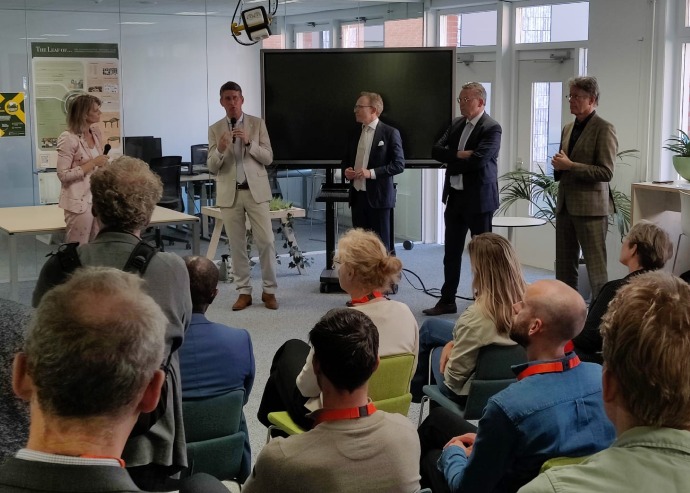University of the North presents seven hybrid research groups

The University of the North has presented seven hybrid research groups at the Hanze University of Applied Sciences (UAS) Groningen Impact event. The University of the North comprises a collaboration between the University of Groningen, Hanze UAS Groningen, NHL Stenden UAS, Van Hall Larenstein UAS, the UMCG, Noorderpoort, and Alfa College, hence the addition ‘hybrid’. The benefits of this collaboration extend not only to the advancement of the Northern Netherlands but also to the intensification of cooperation between vocational education (mbo), universities of applied sciences (hbo), and academic institutions (wo). The research conducted within these hybrid research groups should lead to new insights that enhance innovation, economic growth, and societal development in the three northern provinces.
From lab scale to pilot scale
The professors from the University, lecturers from the universities of applied sciences, and vocational education practitioners will collaborate in these hybrid research groups to address societal challenges. They are focused on the societal transitions faced in the Northern Netherlands (Energy & Climate, Healthy Ageing, Digitization & Artificial Intelligence, and Governance & Sustainability). The aim of the hybrid research groups is to apply research results more rapidly in the business sector and public organizations.
The seven hybrid research groups presented focus on Quality of Life for people with severe multiple disabilities, Digital Transformation and Literacy, Built Environment, Bioplastics, Human Capital, Biobased Chemistry, and Spatial Transformation Water & Climate.
In 2021, the first hybrid research group of the University of the North, Sustainable Polymers, was initiated, involving the University of Groningen, NHL Stenden, and Drenthe College.
Dick Pouwels, chairman of the Executive Board of Hanze University of Applied Sciences Groningen, states on behalf of the University of the North: “The power to truly have an impact on people's development and society lies in collaboration. The hybrid research groups are a great example of that. This collaboration is not new; we have been working together extensively within these knowledge institutions. However, with these seven hybrid research groups, we significantly expand our joint vocational, applied, and academic research, taking our collaboration within the University of the North to a higher level."
Why collaborate?
This collaboration aims to contribute to strengthening and vitalizing the region and its inhabitants, by enhancing the innovation capacity of its businesses, further developing public organizations, and bolstering social and societal connections.
Furthermore, both fundamental and practice-oriented research will be strengthened, with the goal of enabling the professional field to benefit more quickly from the research results. The integration of education, research, and professional practice (vocational education - applied sciences - university) will also be intensified. The hybrid research groups provide an educational environment where students from vocational education, universities of applied sciences, and academic education can collaborate on research assignments. Finally, students will have more direct exposure to current societal challenges, developments, and employers in the region.
More news
-
15 September 2025
Successful visit to the UG by Rector of Institut Teknologi Bandung
